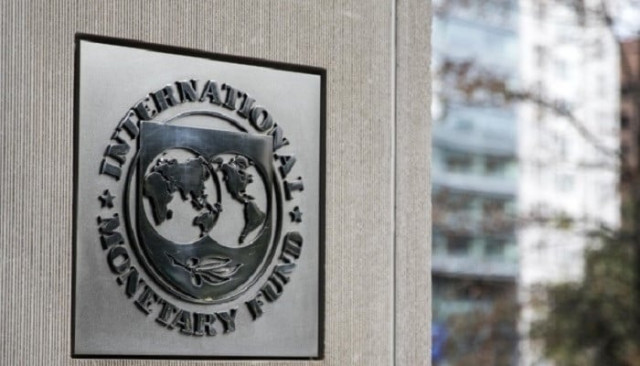Pakistan-IMF talks likely in Doha on May 18
No immediate bailouts expected from friendly countries

Pakistan and the International Monetary Fund (IMF) may begin talks on May 18 in Doha, as the country’s options to avoid insolvency have been limited after it could not immediately receive any major financial support from its three friendly countries.
Subject to the government’s willingness to start withdrawing fuel subsidies from May 15, the two sides have tentatively planned to meet in Qatar for policy level discussions to revive the programme and extend its tenure and size to $8 billion, a senior government functionary told The Express Tribune.
The IMF has informed the government that it could send a mission to Doha for one week on May 18 for talks with Pakistan on the revival of the Extended Fund Facility, said the officials. However, Prime Minister Shehbaz Sharif will have to overcome all obstacles from his cabinet members before that and has to make a decision on fuel subsidies.
The sources said Prime Minister Shehbaz had directed the finance ministry to once again ask the IMF to partially relax its condition of increasing fuel prices.
The development comes amid a delay in finalisation of new loan deals with Saudi Arabia, China and the United Arab Emirates (UAE).
Pakistan is awaiting a rollover of $2.3 billion Chinese commercial loan. Another $1 billion Chinese deposit is maturing this and the next month.
China has now placed a condition for the renewal of its $2.3 billion loan, which Pakistan returned in March on the hope of getting it back in April but still remains undisbursed.
The sources said China wanted that its loans could not be used for any purpose and should only be treated as part of the reserves because of Pakistan’s weakening financial situation.
The government has requested that the loan money should at least be allowed to use for making payments against Chinese imports. The sources added that the decision was pending.
No dates for Prime Minister Shehbaz’s maiden visit to China have been announced but the possibility of visual contact between the heads of the two governments was being explored, said the sources.
The finance ministry did not officially comment on the matter.
The sources said the prospects for immediate additional cash injection by Saudi Arabia before an IMF deal were not very high. However, it is unlikely that the kingdom would withdraw $3 billion cash facility that had been secured in November last year at an interest rate of 4%.
The chances for receiving more oil on deferred payments over and above the existing limit of $100 million per month were also low, they added.
Read ‘Federal govt must share IMF deal details’
Late last year, the country had secured $1.2 billion annual oil facility ($100 million per month) on deferred payment at an interest rate of 3.8%.
Instead, the sources said, Saudi Arabia has offered to facilitate Pakistan in receiving oil facility from Islamic Development Bank’s commercial arm – International Islamic Trade Finance Corporation (ITFC) or from the Organisation of the Petroleum Exporting Countries (OPEC) Fund for International Development.
But the ITFC and OPEC Fund facilities would be different from what Pakistan was seeking. Pakistan is already availing an ITFC oil facility at 4.5% interest rate.
The government had also requested the Saudi Arabia to reduce interest rates on the existing cash and oil facilities, but this seemed difficult.
Last month, Finance Minister Miftah Ismail requested the IMF to extend the programme duration from September 2022 to June 2023 and also increase the loan size from $6 billion to $8 billion.
The country’s external finances situation remain precarious, as it is left with only $10.5 billion gross official foreign exchange reserves while its monthly import bill was $6.6 billion in April.
The $10.5 billion is inclusive of $4 billion of China, $3 billion of Saudi Arabia, and $2.5 billion of the UAE deposits.
Read Market watch: Stocks rally due to clarity about IMF package
Former State Bank of Pakistan (SBP) governor Dr Reza Baqir pumped billions of dollars in the exchange market to defend the weakening rupee but ended up losing the precious reserves, the finance ministry sources said.
The PML-N-led coalition government seems in a fix over its policy choices to steer the country out of the current serious economic crisis. The IMF deal is not possible without first withdrawing the fuel subsidies but there appears to be a deep division within the government.
Some senior party leaders and cabinet ministers have advised the prime minister against increasing petrol and diesel prices, making the job difficult for the finance minister.
Currently, the government is giving Rs29 per litre subsidy on petrol and Rs73 on high speed diesel – which both the finance ministry and the IMF want to reverse.
The previous PTI government had laid landmines as it not only gave these subsidies, but provided wrong estimates of the cost. The former finance minister had initially said the fuel subsidies would cost Rs146 billion for March-June period.
However, the Economic Coordination Committee (ECC) has already approved Rs101 billion subsidies till April 30 and the estimates for May stand at Rs102 billion.
The IMF is also receiving mixed signals, as former finance minister Ishaq Dar has publicly opposed extending the programme to June next year and increasing the fuel prices, arguing that the government should negotiate a fresh deal.
However, the time is running out as the government has made a plan to announce the fiscal year 2022-23 budget on June 10 and before that it needs an agreement with the IMF.



















COMMENTS
Comments are moderated and generally will be posted if they are on-topic and not abusive.
For more information, please see our Comments FAQ